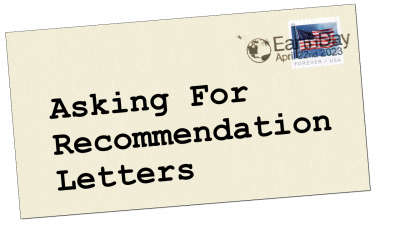
Read This!
Postgraduate degree programs such as graduate school, medical school, dental school, etc. require you to submit recommendation letters as part of your application. The specific program you are applying to will provide details about the nature of these letters. You may also need to write a cover letter, CV or Résumé, and a Personal Statement.
The UCONN Center for Career Development has a number of excellent resources:
- The resource on Writing a Résumé is an excellent guide to constructing your CV.
- The resource on Writing a Cover Letter will help you write your cover letter.
- The resource on Writing a Personal Statement will help you write your personal statement.
- The Center for Career Development also offers critiques and coaching.
Students often ask faculty members to write them letters of support. Here are some important things to keep in mind:
- I cannot write letters for students that I have had in only a single class in a single semester.
- You should ask for letters well in advance of the deadline. Be respectful of the fact that your professors have complex schedules and that those with active research programs may be away from the office for extended periods.
- Build relationships with faculty. Ask questions, come to office hours.
- Letters from faculty you have worked closely with carry more weight than letters from faculty who just know of you from a class.
- Letters from faculty you have taken more advanced classes from carry more weight than letters from faculty from whom you took more introductory level classes.
- Letters from faculty you have worked with more recently carry more weight than letters from faculty with whom you have not worked recently.
The Pre-Medical and Pre-Dental Advising Office provides resources to UConn students and alumni interested in health professions careers. If you are applying to medical or dental school, I will only supply letters through the application portals in the advising office, and I will not supply letters directly to an individual or institution.
- Your overall academic record matters more than your performance in any one course.
- The Pre-Medical and Pre-Dental Advising Office can give you a realistic assessment of whether your academic record is strong enough for you to be competitive for the programs you are considering.
- Most sources suggest that a cumulative GPA of less than 3.5 is not considered competitive for medical or dental school.
- If a faculty member knows of you only from your enrollment in a course, and if your cumulative GPA is not strong, the faculty member will have a difficult time writing you a strong letter of support that will help you gain admission to a competitive program.

I’m happy to write a recommendation letter to help you build a career…but a letter is not some simple thing that I can toss off in a few minutes…
I can write letters for students that:
- Ask well in advance of deadlines, especially if deadlines fall during periods when I am traveling for research.
- Have a realistic chance of being admitted to the program(s) to which they are applying.
- Provide detailed information about the opportunity or program they are applying for.
- Provide a list of courses they have taken.
- Provide a CV.
- Provide a complete academic transcript.
- Provide a personal statement.
- Provide highlights of your background that I should consider emphasizing.
- For medical school, a copy of the AMCAS cover letter with barcode.
I can write the strongest letters for students who:
- Demonstrate potential by performing well in my classes
- Demonstrate growth by improving their performance
- Help me get to know you
- Have performed well in upper level (not just intro) classes
- Can clearly articulate why they are applying for the opportunity or program
- Provide materials to me with enough time for revisions.